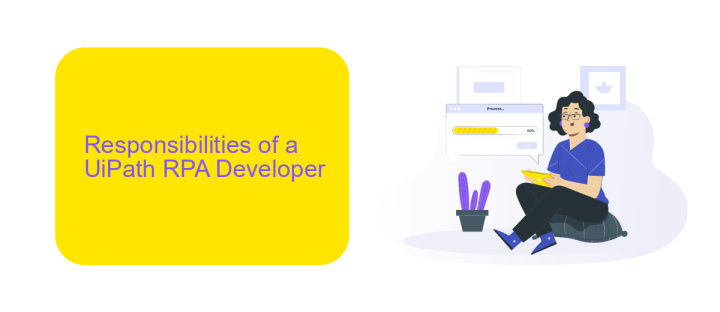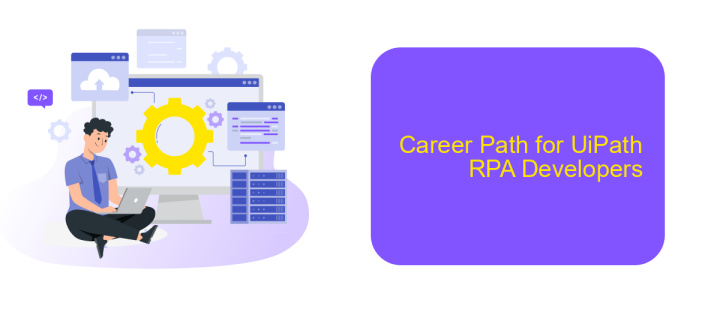What is UiPath RPA Developer
A UiPath RPA Developer specializes in creating and managing automated workflows using UiPath's Robotic Process Automation (RPA) platform. These professionals streamline business processes by designing bots that perform repetitive tasks with high efficiency and accuracy. In this article, we explore the role of a UiPath RPA Developer, their key responsibilities, and the skills required to excel in this rapidly evolving field.
Introduction to UiPath RPA Developer
UiPath RPA Developer is a professional specializing in the design, development, and implementation of robotic process automation (RPA) solutions using UiPath's platform. They are responsible for creating software robots that can perform repetitive tasks, streamline business processes, and enhance operational efficiency. These developers play a crucial role in transforming traditional workflows into automated systems, enabling organizations to save time and reduce errors.
- Design and develop RPA solutions using UiPath Studio
- Collaborate with business analysts to identify automation opportunities
- Test and deploy RPA bots to ensure functionality and performance
- Monitor and maintain deployed bots for continuous improvement
- Integrate RPA solutions with other systems and services using tools like ApiX-Drive
By leveraging the capabilities of UiPath and integration services like ApiX-Drive, UiPath RPA Developers can connect various applications and automate complex workflows seamlessly. This integration allows for enhanced data flow and interoperability between systems, making the automation process more efficient and effective. As a result, businesses can achieve higher productivity and better resource utilization.
Responsibilities of a UiPath RPA Developer

A UiPath RPA Developer is responsible for designing, developing, and implementing automated workflows using UiPath's RPA platform. They collaborate closely with business analysts and stakeholders to understand process requirements and translate them into efficient automation solutions. Their role involves creating detailed documentation, conducting testing, and ensuring the reliability and scalability of the automated processes. They must also provide support and maintenance for the deployed bots, troubleshooting issues and optimizing performance as needed.
Additionally, a UiPath RPA Developer is tasked with integrating various systems and applications to facilitate seamless data flow and process automation. Using services like ApiX-Drive, they can set up integrations between UiPath and other platforms, enabling smooth communication and data exchange. This involves configuring APIs, managing data mappings, and ensuring that the integrations are secure and efficient. Continuous learning and staying updated with the latest RPA trends and UiPath features are also crucial aspects of their responsibilities to ensure the delivery of cutting-edge automation solutions.
Qualifications and Skills Required

To excel as a UiPath RPA Developer, a combination of technical proficiency and problem-solving skills is essential. This role requires a deep understanding of automation processes, software development, and integration capabilities to create efficient robotic process automation (RPA) solutions.
- Proficiency in UiPath Studio, Orchestrator, and other UiPath components.
- Strong understanding of programming languages such as C#, VB.NET, or Python.
- Experience with API integration and services like ApiX-Drive for seamless connectivity.
- Knowledge of database management systems and SQL queries.
- Ability to design, develop, and deploy RPA solutions with a focus on scalability and reliability.
- Excellent problem-solving and analytical skills to troubleshoot and optimize automation workflows.
- Good communication skills to collaborate with cross-functional teams and stakeholders.
In addition to these technical skills, a successful UiPath RPA Developer should be adaptable and eager to stay updated with the latest automation trends and technologies. Continuous learning and professional development are key to maintaining a competitive edge in this rapidly evolving field.
Career Path for UiPath RPA Developers

A career as a UiPath RPA Developer offers numerous opportunities for growth and advancement. Starting as a junior developer, individuals typically focus on learning the basics of UiPath and developing simple automation scripts. As they gain experience, they can advance to more complex projects, involving the integration of various systems and applications.
With proficiency, developers can specialize in areas such as process analysis, solution architecture, or project management. They might also become experts in specific industries, tailoring automation solutions to meet unique business needs.
- Junior RPA Developer: Focus on basic automation tasks and learning UiPath tools.
- Mid-Level RPA Developer: Handle more complex projects and integrations.
- Senior RPA Developer: Lead teams, design solutions, and manage projects.
- RPA Architect: Develop comprehensive automation strategies and frameworks.
- RPA Consultant: Provide expert advice and tailor solutions for clients.
Utilizing services like ApiX-Drive can significantly enhance an RPA developer's capabilities by simplifying the integration of various applications and services. This allows developers to create more efficient and versatile automation solutions, thereby increasing their value in the job market.
Conclusion and Outlook
As we have explored, a UiPath RPA Developer plays a crucial role in automating business processes, enhancing efficiency, and reducing operational costs. Mastery in UiPath tools and a strong grasp of programming concepts are essential for success in this field. The demand for skilled RPA developers is on the rise, making it a promising career path for those interested in technology and process optimization.
Looking ahead, the integration of RPA with other technologies such as AI and machine learning is expected to further revolutionize how businesses operate. Tools like ApiX-Drive can facilitate seamless integrations, enabling RPA developers to connect various applications effortlessly. This continuous evolution in the RPA landscape offers exciting opportunities for developers to innovate and drive significant business transformations.


FAQ
What is a UiPath RPA Developer?
What skills are required to become a UiPath RPA Developer?
How do you integrate UiPath with other systems?
What are the common use cases for UiPath RPA?
How do you ensure the security of automated processes in UiPath?
Strive to take your business to the next level, achieve your goals faster and more efficiently? Apix-Drive is your reliable assistant for these tasks. An online service and application connector will help you automate key business processes and get rid of the routine. You and your employees will free up time for important core tasks. Try Apix-Drive features for free to see the effectiveness of the online connector for yourself.

